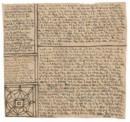 There are things I keep promising to do, two of which jump out at me: Review Reality Hunger (which will happen, and soon), and read Robert Walser. The latter might have to wait a little while longer, but that didn’t keep my from enjoying Jacob Silverman’s recent piece about Walser in the Virginia Quarterly Review. Silverman describes the innovative Swiss writer as “an ethereal figure, divorced from time: an apolitical person in a period of great political upheaval; a barely educated wanderer who’s garnered the posthumous reputation of a hermit genius; a literary mystic miscast as blindly mad, when he in fact was all too aware of his own complicated demons.”
There are things I keep promising to do, two of which jump out at me: Review Reality Hunger (which will happen, and soon), and read Robert Walser. The latter might have to wait a little while longer, but that didn’t keep my from enjoying Jacob Silverman’s recent piece about Walser in the Virginia Quarterly Review. Silverman describes the innovative Swiss writer as “an ethereal figure, divorced from time: an apolitical person in a period of great political upheaval; a barely educated wanderer who’s garnered the posthumous reputation of a hermit genius; a literary mystic miscast as blindly mad, when he in fact was all too aware of his own complicated demons.”
The essay is pegged to Walser’s “microscript” writing (Walser called it his “pencil method”), which allowed him to finish entire stories on surfaces like postcards, envelopes, and receipts.
Christopher Middleton, another of Walser’s translators into English, has likened Walser’s childlike wonderment toward the world, and his “untutored” development as a writer, to the primitivism and “naïve art” movements then underway in the form of practitioners like Henri Rousseau. [. . .] But any childlike character Walser may have had seems more like a method of escape from a tormented self than a concerted attraction to the markers of youth. Walser’s identity, if any, was predicated on self-abnegation, a gradual erasure: his characters desire nothing more than a small room to call their own and often comment that they are “zeros.” Reflecting on being in an asylum, the author told Seelig, “I am not here to write but to be mad.” Ironically, this vow of literary silence, a comment charged with disgust at an uncomprehending world, has become one of his most famous and quoted lines. [. . .]
When Walser was using the pencil method, he was not fully himself. He was plumbing a space somewhere between automatic writing and traditional composition. It was a half-conscious effort, a way to escape his analytical self, his self-castigating mind, by tricking it into being loose, uncaring and to learn to write, to play, anew.

